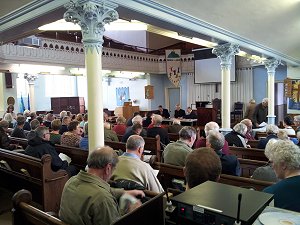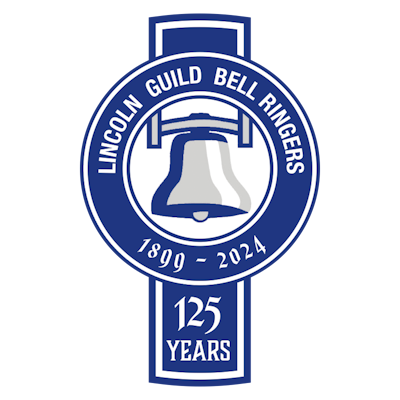Guild AGM 2014 - 26th April 2014
The AGM this year followed a slightly different format than last year, but still started off with ringing at the Cathedral at 09:30 prior to the communion service in the Ringer's Chapel at 10:00. There were 49 communicants this year, which is considerably more than last year. The Very Reverend Philip Buckler, Dean of Lincoln Cathedral and of course President of the Lincoln Diocesan Guild of Church Bell Ringers, conducted the communion service, assisted by Jonathan Clark.
We were again fortunate this year to have use of Bailgate Methodist Church's facilities for the meeting and lunch. The meeting was conducted in the body of the Methodist Church itself.
After the apologies for absence had been taken, the President led a short tribute to those members who had passed away in the previous year.
The minutes of the previous AGM had been circulated in advance and there was no need to read it to the members present. The minutes of the last AGM were accepted as a true record.
The meeting proceeded smoothly through the Roll of Honour Presentations and the Ratification of Non-Resident Life members. Roger gave a thorough overview of the accounts, which again indicated that membership was declining. The Annual Guild Report was adopted by the members.
 Left to Right : Roger Lord (Treasurer), Alan Payne (Master), The Dean (President), and Sandra Underwood (Secretary) |
 The meeting |
The election of officers proceeded smoothly with no changes to the present officers. Similarly the Guild Committee appointments were also ratified.
Subscription charges are to remain the same this year, but the split is slightly different with 50% going to the General Fund, 35% to the Bell Repair Fund and 15% going to the Branches.
The meeting then turned to the Guild Strategic Review.
The first white paper to be discussed was the one on The Operation and Administration of Membership Officers and Committees. This one probably generated the most discussion, especially subclauses B1 and B2 (Election of Officers). It was felt that while a formal nomination paper with proposer and seconder was fine, also including a manifesto statement would never happen, especially at Branch level elections. Finding candidates at present usually involves some arm twisting and making it more onerous would put candidates off. We are just a voluntary organisation after all. Also in clause B2, the fixed term of three years in the elected position with a maximum of two consecutive terms, was going to be too restrictive. Most members (again at Branch level) in most cases are quite happy that someone has been (for example) Treasurer for the last 10 years and hr/she is doing a good job and is willing to continue, so why force them out after 6 years. Chances are that no one else want the job anyway. If it isn't broken then don't try and fix it. Also some positions (e.g. Webmaster) require a certain degree of specialist technical knowledge that should be retained if possible
This eventually became resolved by making the proposals optional (but recommended) at the Branch level.
The next white paper on Training and Ringing Centres generated far less controversy. Basically the establishment Ringing Centres and having a Training Officer were seen as positive steps forward, even if the exact details of how it would all work were still a bit vague.
The next white paper on Tower Groupings and Striking Competitions was also reasonably well received. Basically allowing groups of towers to form a cluster for Striking Competition entry was seen as positive, provided that the towers are geographically close by. This would not exclude clusters crossing Branch boundaries.
The spliting of the Cup for a method test piece and the Plate for Rounds / Plain Hunt test piece generated a bit of debate. What is to stop a very exerienced band entering the Plate and ringing Rounds and Call changes to win, when they could easily have entered the Cup and maybe come second. This argument has been around for years and is unlikely to go away. Alan Payne stated that he would hope that towers would enter into the spirit of the competition by entering teams wisely and at the end of the day it is just a bellringing competition and perhaps the taking part is more important than the winning.
The final part of the review were to examine the proposed rule changes. These were put up side by side on an overhead projector for everyone to see. In short the points discussed in the white papers (especially the first one) were integrated into the rule changes.
After future Guild activities had been outlined, there was a short Any Other Business, before the Vote of Thanks.
There was no lunch this year, due to the expected length of the AGM (which was about two and half hours). Members made their own arrangements for lunch.
Ringing continued in the afternoon at St. Botolph's & St. Peter at Gowts on the High Street, plus also at St. Giles and the Cathedral before Evensong. Unfortunately the webmaster had to bow out before the afternoon ringing took place, so no further information is available.
This was a difficult and somewhat controversial AGM and it is hoped that the proposed changes will enable the Lincoln Diocesan Guild of Church Bell Ringers to move successfully forward into the future.
Jonathan Clark (Webmaster)
